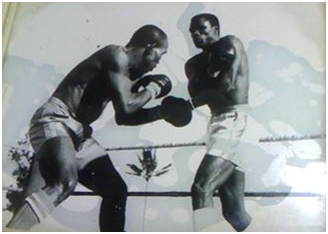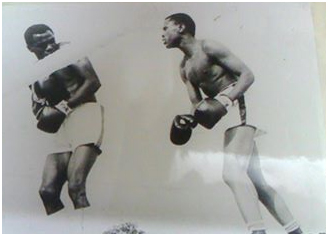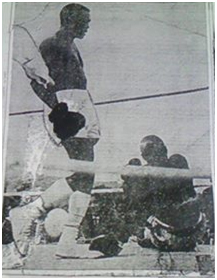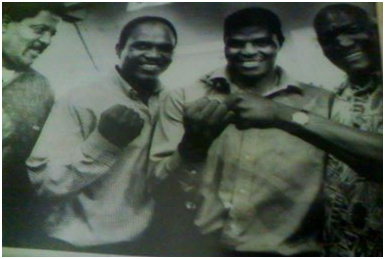Maxwell Mduduzi Malinga, was one of South Africa’s most gifted and beloved fighters in the 1970s and 80s. He was born on 09 November 1947 at Steadville, Emnambithi. A renowned South African boxer, Malinga’s career was inspired by Titus Ntombela who had boxed as an amateur. [i] Malinga would go on to make a brilliant career out of boxing. He started his boxing career at the age of 17 when he won the Natal Midlands lightweight title. He again won two Natal titles before he made his professional debut at the AG Magubane Stadium in Steadville on 27 July 1968. [ii]
 Photograph courtesy of Faizel Malinga
Photograph courtesy of Faizel Malinga
This was a sterling win against Phuthuma Khuboni in the third round. Although after this win, he went on to lose two of his first five fights, he made a brilliant come-back when he remained undefeated in his next eight fights before losing to Enoch Nhlapho, a three-time national champion and one of the greats in SA boxing history. On 27 June 1970, two years after turning professional, Malinga hit the headlines when he won at a tournament which featured eight of the country’s best prospects at the time - where he won a brand new station wagon Vailent.
 Photograph courtesy of Faizel Malinga
Photograph courtesy of Faizel Malinga
In October 1973, Malinga won the vacant SA welterweight title when he fought against Mackeed Mofokeng. In October 1974, in what was described as “possibly the best performance of his career”, he crushed former WBA junior welterweight champion Eddie Perkins over ten rounds. After he had defended the national welterweight title three times, he lost the title to Morris Mohloai in May 1975, which he unfortunately did not regain in a rematch in November the same year. In 1974, Malinga was ranked at No. 7 by the WBA (the only other organisation at the time was the WBC, i.e. World Boxing Council).
When he moved up to middleweight in 1977, he won the vacant South African title (in June) when he defeated Victor Ntloko. In 1978, he lost to Elijah Makhathini (on points) in a non-title fight. His middleweight crown, which he had won in 1977, was lost to Daniel Mapanya. [iv]
 Photograph courtesy of Faizel Malinga
Photograph courtesy of Faizel Malinga
Ron Jackson wrote “There were striking similarities between Muhammad Ali and Maxwell Malinga, one of the most talented and popular SA fighters in the 1970s. Malinga, just as Ali had been, was well known for producing attention-grabbing quotes before a fight as he tried to “psyche out” his opponents. He also converted to Islam, as his hero had done. His charm and engaging smile helped make him a cult figure in the Natal province, now KwaZulu-Natal”. [v]
In 1996 he made history by becoming the first South African fighter ever to win the WBC super-middleweight belt, which he annexed from British star Nigel Benn. Unable to stay away from boxing, he also trained fighters and promoted tournaments under the banner of Starline Promotions. Amongst the people whom he inspired to take up boxing are Vusumuzi Malinga, Patrick Malinga, Mthokozisi Malinga and Faizel Malinga. Through Malinga’s encouragement they have managed to keep the home fires burning in KwaZulu Natal. [vi]
Described as a “brilliant defender who could stand toe-to-toe with his opponents and make them miss, he hardly experienced a dull moment in his boxing career”. [vii]
Malinga’s impressive boxing career records as follows:
41 wins (11 KO)
14 losses
3 draws and 12 wins inside the distance. [viii]
He went on to transfer his skills to not only his family, but young boys and girls in Steadville. Let us celebrate this legend!
 Photograph courtesy of Faizel Malinga
Photograph courtesy of Faizel Malinga
Endnotes
[i] Box Rec “Maxwell Malinga obituary”,
[ii] Supersport “Shades of Ali in South Africa”
[iii] All pictures have been supplied by Maxwell Malinga’s son, FaizelMalinga.↵
[iv] Box Rec “Maxwell Malinga’s record”,
[v] Supersport “Shades of Ali in South Africa”
[vi] Sowetan Live “The Hitters Keep Coming From Malinga Clan”
[vii] Box Rec “Maxwell Malinga obituary”,
[viii] Box Rec “Maxwell Malinga”,
About the author: Ntando PZ Mbatha is from Emnambithi in KwaZulu Natal. She works as a Heritage Coordinator for the Department of Sport Arts, Culture and Recreation. She holds a Master’s Degree in History from the University of the Free State. She has in the past conducted research on the history of Steadville, the role of women in liberating South Africa, the Truth and Reconciliation Commission, and the heritage landscape in South Africa. She is currently a contributor for The Journalist. She has also presented papers at conferences since obtaining his Master’s Degree in 2011. She hosts a blog http://nthandz09.wordpress.com